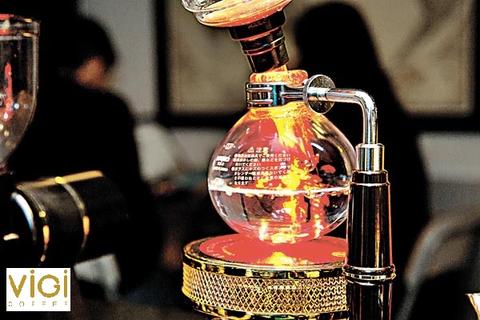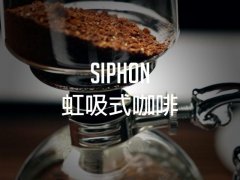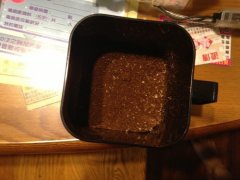Tips for siphon coffee champion brewing: what is the siphon pot suitable for? coffee bean mixing sticks and techniques to share

Professional coffee knowledge exchange more coffee bean information please follow the coffee workshop (Wechat official account cafe_style)
Timeless siphon pot coffee explanation | principle and brewing suggestion of siphon pot coffee
Many coffee enthusiasts have a siphon pot at home. Although the brewing process is not difficult, it may not be possible for all of them to win a prize or even become a master. At the Accro Coffee Hong Kong siphon barista contest, I met Pinky, who ranked No. 1 in the world in 2013 and won the siphon barista contest in Hong Kong for two years in a row. I stopped by to ask her for some tips on how to brew champion siphon coffee.
Champion coffee beans
In order to become a siphon master, it is not as complicated as imagined. First of all, let's talk about coffee beans: in the siphon barista contest in Hong Kong, most of the contestants chose the reserved Panamanian geisha (Geisha), while Pinky chose the suntanned pearls of Yegashev, Nyer iAA of Kenya and Ras Larrajas of Costa Rica, which were matched with three medium-priced boutique beans. A good match does not necessarily use the most expensive coffee beans. If you want to become a champion bean, you must go through five hurdles and go through countless tests of baking degree and taste before you can successfully find the perfect combination. The match of this champion is by no means a false name. Yegashev is the most famous coffee producing area in Ethiopia. Washed Yegashev has clean and delicate aromas of flowers, orange and lemon; Gostrica tanned pearls have rich and bright red cherry fruit flavors with outstanding sweetness and warm feeling; Kenyan Nyeri AA has a touch of Zhu Guli and the sweetness of ripe nuts, enhancing the layer and thickness of the blend. The combination of three beans makes this cup of champion coffee aroma, sweet, sour, chocolate and nut flavor, very balanced, refreshing and refreshing, even emitting different flavors at different temperatures, with rich layers, suitable for drinking before meals. Wake up your stomach.
Tips for champions
If you have good coffee beans, you should also make careful preparations. Even if it is as simple as a bean grinder, you cannot be careless. The roughness of each bean grinder is different, and the scales of different brands will vary greatly. Pinky uses a Japanese Kalita electric bean grinder with a scale of 3-4, which produces less coffee powder than coffee sugar.
Some baristas put the hot water on the pot before adding the coffee powder, while the Pinky put the coffee powder on the water. If the powder falls into the water, the coffee powder will have a certain impact force when it hits the water, so that the powder layer will come into contact with hot water for different times, so that the extraction time and taste will be affected, and the impact force and the speed of falling powder will be difficult to control, and the quality will be difficult to unify.
A pot of well-brewed coffee should clearly see the upper, middle and lower three layers: the top layer is white foam, the middle is the coffee powder layer, and the bottom is coffee (water). If there is no or little foam on the top layer, it means that the position of the filter is crooked.
Selective strainer
Siphon pot has filter cloth, filter paper and metal three kinds of filter screen, Pinky will choose the traditional filter cloth as filter screen. The used filter cloth must be soaked in water for a long time and changed every day, and then washed with hot water before cooking. The best way to clean the filter cloth is to cook it in a siphon pot, that is, just like you usually make coffee, but without coffee powder. When the hot water still stays in the top pot, pour out the water and do not let the water filter back into the bottom pot. The purpose of this is to loosen the fiber of the filter cloth and to prevent the hot water from cooling sharply when it touches the filter cloth. If you don't cook very often, you can change a new piece of cloth every two weeks or a month. The filter screen should be placed in the middle. If it is in the right position, there will be some evenly distributed and small bubbles rising; if it is placed askew, the atmospheric bubble column will tumble in the water, and the bubble column will constantly penetrate and hit the powder layer, making the extraction uneven.
Mixing rods and techniques
There are many mixing rods of different materials and shapes, says Pinky. The most important thing is to match. Some Japanese use paddle sticks to shake back and forth, while she chooses bamboo sticks. Rinse the bamboo stick with hot water before and after each use to wash the coffee grease and taste off the surface and preheat the bamboo stick.
At first, when the coffee powder is wet with hot water, stir once with a bamboo stick and stir in a circle at a speed of about one circle per second to help the coffee powder wet the water evenly. Then boil for about 50 seconds, no more than one minute at most, and stir again when the coffee is extracted, in order to help release the flavor of the coffee. That is, stir twice before and after.
Contestants are required to brew five pots of coffee at the same time within 15 minutes. Each pot of coffee grounds must be of the same shape. Wash it as soon as possible after each brewing, because if the coffee oil hangs for too long, the color is more difficult to wash. Simply clean the siphon pot with clean water and dishcloth. Never use detergent or brush.
Tips for siphon coffee brewing
Successful chefs usually don't mind sharing recipes because they can keep innovating! Pinky is also happy to share her winning experience in making siphon coffee.
Tools:
HARIO TCA-3 siphon glass coffee maker
Long-body stirring stick (bamboo, wood or plastic)
Bean grinder
Halogen lamp heater (or other heat source)
Electronic scale
timer
Materials:
20-21 grams of coffee beans
200-210 ml hot water (brewing coffee)
50-100 ml hot water (pre-soaked filter cloth)
Extraction amount: 1 part of coffee beans is better than 10 parts of water.
World siphon baristas Competition (The World Siphonist Championship)
.
Important Notice :
前街咖啡 FrontStreet Coffee has moved to new addredd:
FrontStreet Coffee Address: 315,Donghua East Road,GuangZhou
Tel:020 38364473
- Prev

Parameters of siphon coffee explain the relationship between the proportion of coffee powder in siphon pot and brewing time
Professional coffee knowledge exchange more coffee bean information please follow the coffee workshop (Wechat official account cafe_style) timeless siphon pot coffee explanation | siphon pot coffee principle and brewing suggestions required materials: siphon coffee pot coffee bean grinder electronic scale thermometer timer brewing time: 22.5 minutes background knowledge: around 1840, a French country
- Next

Tips for siphon coffee brewing details of coffee grinding in siphon pot
Professional coffee knowledge exchange more coffee bean information please follow the coffee workshop (Wechat official account cafe_style) timeless siphon pot coffee explanation | siphon pot coffee principle and suggestion siphon coffee pot romantic elegance, very much in line with the aesthetic taste of the East. When you make a cup of coffee so carefully and carefully, it looks crystal clear.
Related
- What is the Philharmonic pressure? How to use Philharmonic pressure to make delicious coffee
- Why does a hand grinder have more fine powder than an electric grinder?
- In addition to the hot mom, what is the difference between the versions of EK43 | ditting and Mahdi ek43?
- What kind of equipment do you need to make coffee by hand? Introduction to novice starter cooking equipment tools
- Espresso needs to be ground how thick and thin scale entry Italian Coffee Machine Bean Grinder investigation and Grinding course
- How much does it cost to open a small private cafe? How much does it cost to learn coffee? How to operate it?
- The difference between the flavor characteristics of hand-brewed coffee and coffee maker is hand-brewed coffee really better than coffee maker? Can I use a coffee machine to make coffee beans by hand?
- The difference between 01 and 02 of hario v60 filter cup what is the difference between 01 and 02 filter cup opening and cooking flavor
- What's the difference between the smart cup and the French kettle? Which is better, the French kettle or the Smart Cup?
- What's the difference between a smart cup and a V60 filter cup? The difference between the taste of smart cup and hand-brewed coffee

